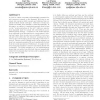Free Online Productivity Tools
i2Speak
i2Symbol
i2OCR
iTex2Img
iWeb2Print
iWeb2Shot
i2Type
iPdf2Split
iPdf2Merge
i2Bopomofo
i2Arabic
i2Style
i2Image
i2PDF
iLatex2Rtf
Sci2ools
124
click to vote
WWW
2006
ACM
2006
ACM
Exploring social annotations for the semantic web
In order to obtain a machine understandable semantics for web resources, research on the Semantic Web tries to annotate web resources with concepts and relations from explicitly defined formal ontologies. This kind of formal annotation is usually done manually or semi-automatically. In this paper, we explore a complement approach that focuses on the "social annotations of the web" which are annotations manually made by normal web users without a predefined formal ontology. Compared to the formal annotations, although social annotations are coarse-grained, informal and vague, they are also more accessible to more people and better reflect the web resources' meaning from the users' point of views during their actual usage of the web resources. Using a social bookmark service as an example, we show how emergent semantics [2] can be statistically derived from the social annotations. Furthermore, we apply the derived emergent semantics to discover and search shared web ...
Emergent Semantics | Internet Technology | Social Annotations | Social Bookmark Service | WWW 2006 |
Related Content
| Added | 22 Nov 2009 |
| Updated | 22 Nov 2009 |
| Type | Conference |
| Year | 2006 |
| Where | WWW |
| Authors | Xian Wu, Lei Zhang, Yong Yu |
Comments (0)

